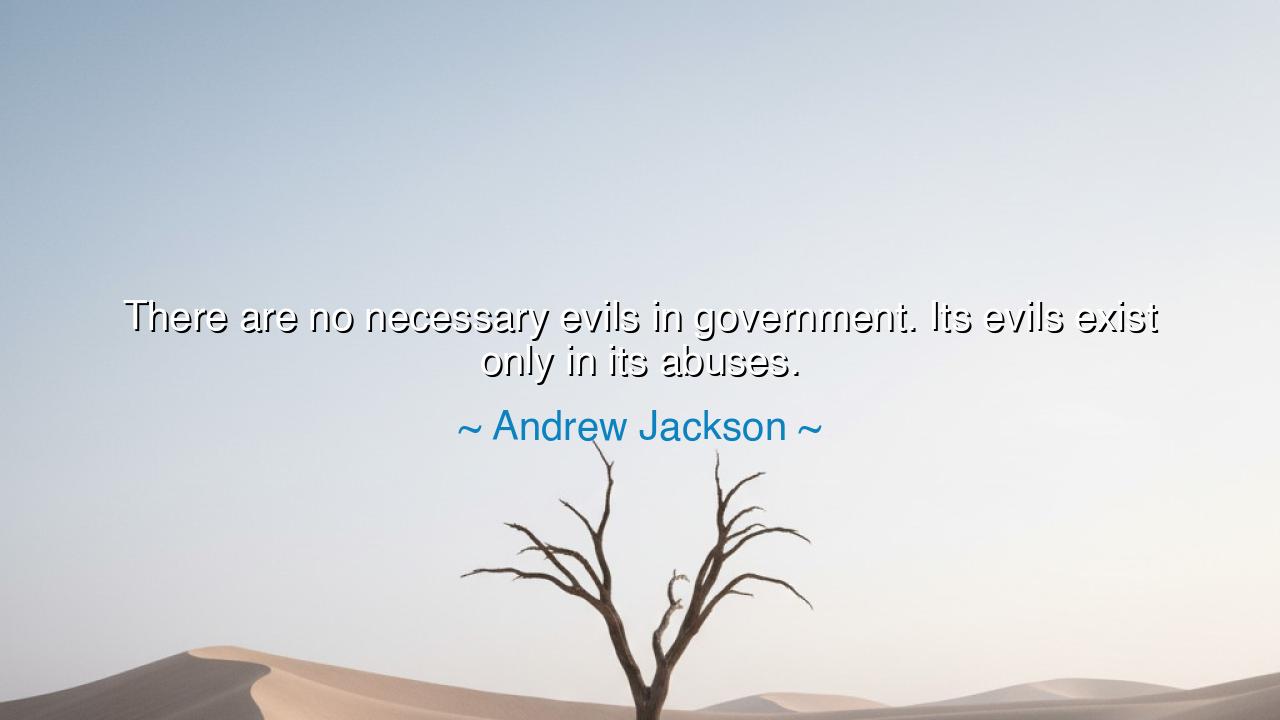
There are no necessary evils in government. Its evils exist only






"There are no necessary evils in government. Its evils exist only in its abuses." – Andrew Jackson
In this noble and stirring declaration, Andrew Jackson, the seventh President of the United States, gave voice to a conviction as old as democracy itself: that government is not, in its nature, evil, but becomes evil only when those entrusted with power forget that they are servants, not masters. When Jackson uttered these words, he spoke as both soldier and statesman—a man who had seen the strength of liberty and the corruption of power. His insight is simple yet profound: the structure of government is not the enemy of the people; the corruption of its purpose is.
The origin of this quote comes from Jackson’s farewell address in 1837, as he prepared to leave the presidency. His tenure had been marked by fierce battles—against entrenched interests, against the national bank, and against political elites who sought to rule rather than represent. To Jackson, the idea that government itself could be an “evil” was false. He believed it to be a tool, capable of great good when wielded with virtue and restraint. But like any tool, once corrupted by greed, arrogance, or tyranny, it could become the very weapon that destroys the freedom it was meant to preserve. Thus, Jackson warned the generations to come: fear not government itself, but the abuse of it.
At its heart, Jackson’s statement reflects a deep faith in the moral agency of man. He rejects the fatalism that sees corruption as inevitable and instead places responsibility squarely on the shoulders of the governed and their governors alike. Government, he implies, is a mirror of its people. If it becomes unjust, it is because men have allowed vice to take the place of virtue. It is not some distant machine grinding of its own accord, but a living system animated by human choice. Hence, to preserve freedom, one must preserve integrity; to sustain justice, one must practice restraint.
History offers many witnesses to Jackson’s wisdom. Consider the Roman Republic, once the envy of the world for its laws and balance of powers. It began not as a tyranny, but as a model of civic order. Yet over centuries, its leaders learned to manipulate the laws for personal gain. Power concentrated, corruption festered, and freedom decayed—not because government was evil, but because its guardians were faithless. By the time of Caesar, the Republic had become a shadow of itself, undone not by its institutions, but by their abuse. So it is with every nation that forgets Jackson’s truth: that the danger lies not in governance, but in the governed’s indifference.
Jackson himself fought such dangers during his presidency. His greatest battle was against the Second Bank of the United States, a powerful institution that, in his eyes, had grown beyond accountability—an instrument of wealth serving a privileged few. He saw it as a perfect example of how government, when intertwined with private interest, ceases to serve the people. “The bank,” he said, “is trying to kill me, but I will kill it!” And he did. Though his actions were controversial, his principle was clear: no power, however efficient, can be allowed to exist without moral oversight. Efficiency without virtue is tyranny in disguise.
In a broader sense, Jackson’s quote is a call to moral courage. The evils of government do not arise spontaneously; they are permitted by silence. Every abuse begins with a compromise of conscience—a lie tolerated, a law bent, a right ignored. Thus, the true defense against governmental evil is not rebellion, but virtue and vigilance. A free people must constantly purify their institutions, just as the body must cleanse itself to remain alive. Liberty is not preserved by laws alone, but by citizens who understand that every right carries a duty, and every freedom a responsibility.
The lesson, then, is timeless: government is neither angel nor demon; it is the reflection of the soul of its people. If it is corrupt, then we must look not only to the rulers, but to ourselves. Each act of honesty, each defense of truth, each demand for accountability strengthens the republic. The true enemy is apathy—for when good men grow weary of guarding their freedom, wicked men grow eager to seize it.
And so, the practical actions are these: cherish your institutions, but never worship them. Question authority, but with reason, not rage. Uphold justice, even when it is inconvenient, and resist every temptation to trade liberty for comfort. For as Andrew Jackson reminds us, there are no necessary evils in government—only the evils that arise when men forget that the power they wield belongs to the people, and through the people, to the God who made them free.






AAdministratorAdministrator
Welcome, honored guests. Please leave a comment, we will respond soon